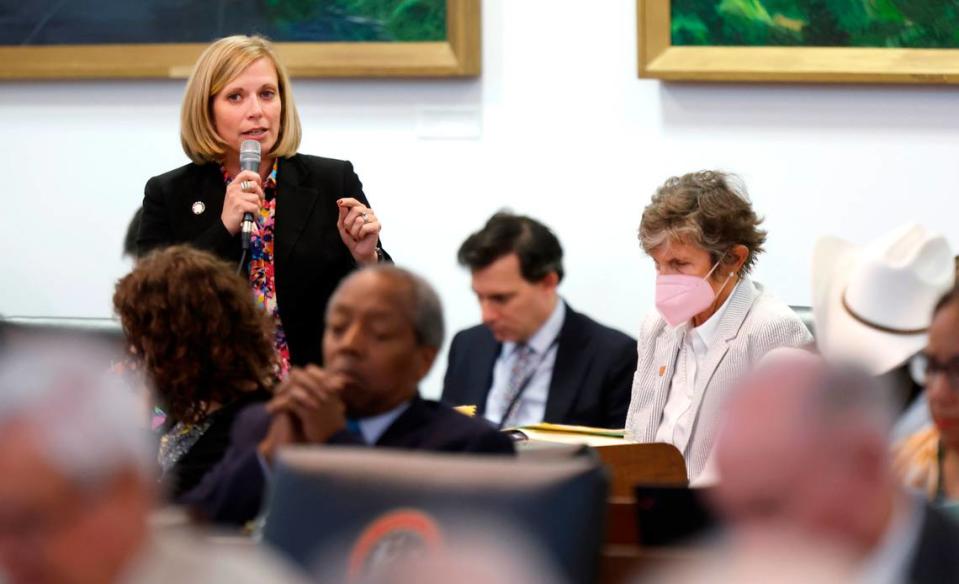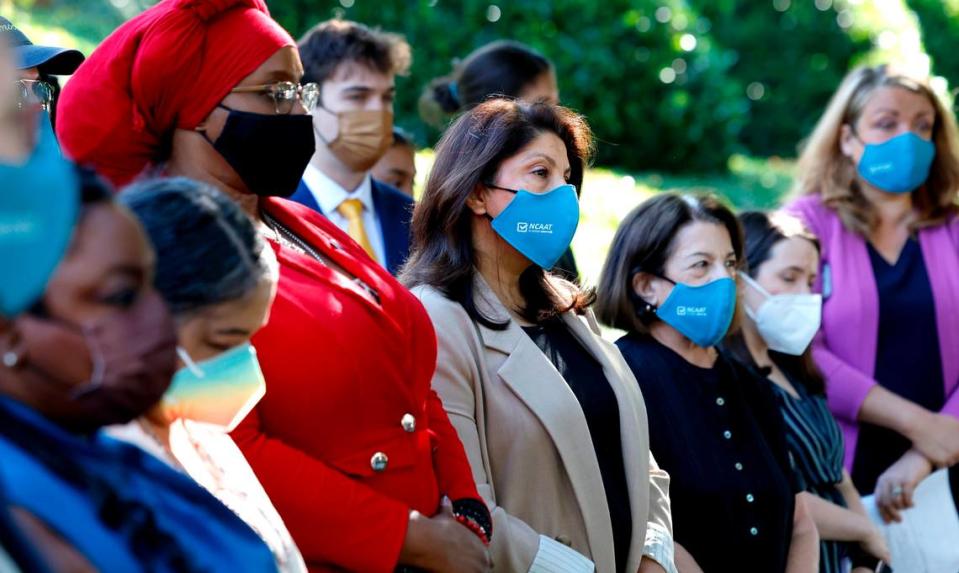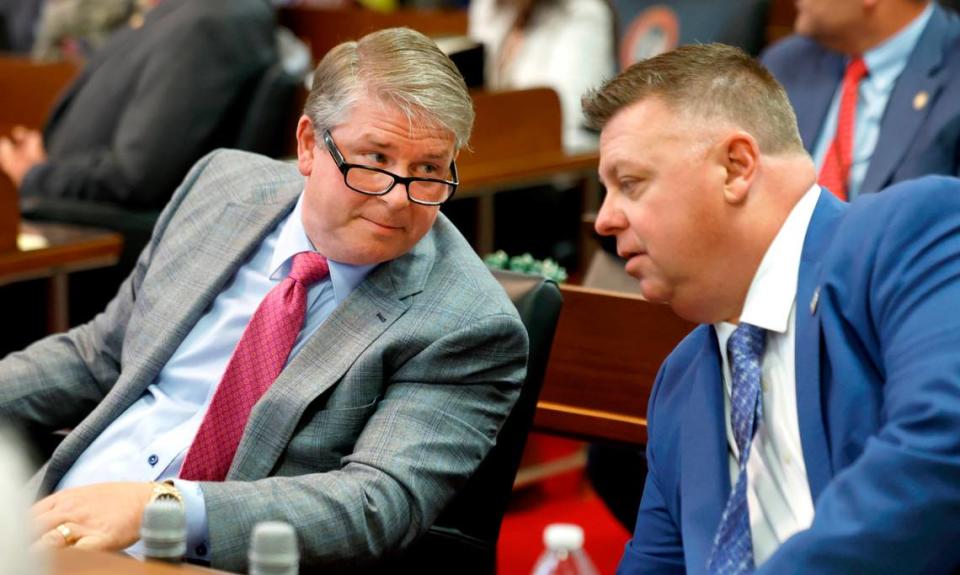NC House sends changes to masking and campaign finance laws to Gov. Cooper
Restrictions on masks, in a bill revised by legislative Republicans last week to include an unrelated, controversial campaign finance provision, are headed to the desk of Gov. Roy Cooper after a final vote Tuesday.
The bill, which was unveiled Thursday as a compromise between House and Senate Republicans, rewrites a provision in state law that allows people to wear masks in public for health and safety reasons, limiting it to only permit “medical and surgical grade” masks, and only for the purpose of “preventing the spread of contagious disease.”
In addition to other provisions that target people who wear masks to hide their identity while committing crimes, and protests that block traffic or emergency vehicles, the bill was changed last week to include a slew of campaign finance changes that Democrats and election law experts say will allow more large-sum contributions from wealthy donors that are difficult to trace.
Ahead of Tuesday’s floor vote in the House, lawmakers debated whether the changes to mask laws would allow people with health concerns to continue wearing masks to protect themselves, and why the campaign finance provisions were being passed through a bill concerning masks and protests.
During floor debate, several Democrats, including House Minority Leader Robert Reives, questioned why the provisions regarding money from federal political committees flowing to state political committees and candidates weren’t filed and taken up in a separate bill.
“Why in the world are we looking at a bill talking about masks and health, at the same time we’re looking at voting?” asked Rep. Abe Jones, a Raleigh Democrat. “I don’t think there’s a single person in this room (that) believes those two subjects are related, because they aren’t. A fifth-grader understands that.”
The House ultimately approved the bill in 69-43 party-line vote, sending it to the Democratic governor, who is widely expected to veto it, setting up likely veto override votes in both Republican-controlled chambers.
Debate continues over proposed changes to masking laws
Several provisions of the bill have come under scrutiny since the masking law changes were first proposed last month.
One change the bill would make covers when police officers can ask people wearing masks for their health to take them off. Current law states that people have to take their masks off if asked by law enforcement officers only if it’s during a traffic stop or at a checkpoint or roadblock, or if the officer had “reasonable suspicion or probable cause during a criminal investigation.”
The bill removes those conditions, changing the language to state instead that anyone masking in public to prevent the spread of contagious disease “remove the mask upon request by a law enforcement officer.”
Rep. Marcia Morey, a Durham Democrat, said that such a provision would likely be found to violate people’s constitutional rights.

Democratic Rep. Pricey Harrison of Greensboro, meanwhile, told lawmakers on the House floor that she would personally be affected by the changes the bill would make, having recently been diagnosed with severe asthma.
Harrison, who often wears a mask at the Legislative Building and was wearing one on the House floor Tuesday, said her pulmonologist told her to wear a mask whenever there’s bad air quality, and said that now that the health exception has been narrowed to only cover preventing the spread of contagious disease, she wouldn’t be covered under that.
During a meeting of the House Rules Committee earlier on Tuesday, Democrats and Republicans went back and forth over the potential effects of the bill, and whether it had the support of the N.C. Department of Health and Human Services.
Rep. John Torbett, a Stanley Republican, told The News & Observer that DHHS told him on Monday that the department wanted to see the exception as currently written stay in place, but drafted three versions of alternative language to improve the bill, one of which GOP lawmakers ultimately settled on last week.
In an email to Torbett’s office, a DHHS official wrote that the department was “not supportive” of the bill as it was rewritten, but clarified that the new language allowing mask wearing only for the purpose of “preventing the spread of contagious disease” would cover people “wearing a mask who may be immunocompromised or otherwise vulnerable populations that want to protect themselves from acquiring the disease.”
“While the provision has been improved, we continue to recommend not repealing the existing physical health and safety exception,” wrote Janssen White, DHHS’s assistant secretary for government affairs.

Cas Shearin, a media strategist with Disability Rights NC, said in a statement that the new health exception in the bill was an “improvement” over the earlier proposal to repeal it completely, but said DRNC was concerned that people with disabilities wearing masks wouldn’t be protected by the contagious diseases language.
Shearin said DRNC was also concerned about how or when people would have to remove their masks.
“We believe it unnecessarily sets people with disabilities up for conflicts in the community,” Shearin said, referring to the removal provision. “Should just any person have the authority to ask you to remove your mask when you run to the store to get some milk for your family? Or if you are enjoying a concert or movie? And we are deeply concerned this legislation will be enforced against some people and not others, particularly disabled people of color because we know they are targeted and arrested at a disproportionately higher rate.”
Jon Guze, a senior fellow in legal studies at the John Locke Foundation — a conservative, free-market think tank — told The N&O the law should take motive into account.
While Guze supports the bill enhancing sentencing for criminals who wear masks, he said making it a crime to wear a mask for medical purposes is not a good idea.
“While many now doubt the efficacy of wearing masks during COVID, there may very well be legitimate medical reasons why some people need to wear masks now,” Guze wrote in a column published by The Carolina Journal. “It’s perfectly possible that masks will turn out to be effective against a different kind of epidemic in the future.”
Campaign finance additions
The compromise mask bill was modified last Thursday to include a slew of campaign finance changes. According to the State Board of Elections and campaign finance experts and advocates who spoke with The N&O, the bill cuts state oversight of federal committees and organizations.
Democrats have said it’s a way to benefit the Republican candidate for governor, Lt. Gov. Mark Robinson. They’ve also said it’ll allow more dark money donations, where the source of the funding is not disclosed.
Meanwhile, Senate leader Phil Berger argued it would “level the playing field in terms of money” coming into the state from partisan political groups.
During the floor debate, Rep. Grey Mills said the bill “resets campaign finance laws to the way they were before.”
Mills, an Iredell County Republican, was referencing a 2020 advisory opinion provided by the State Board of Elections to the Democratic Governors Association. This advisory said that federal Super PACs can’t give money to state political-party committees because that would go around the ban on corporations giving directly in North Carolina.
The bill would eliminate the requirements under this opinion, according to a State Board of Elections analysis of the bill.
The bill does “not open the door to dark money,” because of how accounts must be kept separate, Mills said. It “just clarifies what is expected is equal and balanced to both parties,” he said.
The bill allows federal entities that receive corporate funds and that can raise unlimited funds — through a separate account from the one receiving corporate donations — to funnel unlimited contributions to political parties and affiliated party committees.

And while it does not change the prohibition on corporations being able to donate to state parties or candidates, it opens the door for them to gain further influence in elections, experts said.
The bill would allow these federal entities to shift money they receive around for different uses, according to Bob Hall, a longtime elections watchdog. The bill also helps donors shroud their identity, Hall said.
Reives, the House Democratic leader, said on Tuesday this bill is “a seismic change” in how campaign finance works in North Carolina.
“Somebody who maybe doesn’t want to be identified with somebody’s Council of State folks. Well, now they can give all kinds of money and you’re right, eventually that money can be tracked,” Reives said.
“We should be aiming for more transparency when it comes to finances because people are buying our elections, not buying you,” he said.
After the floor vote, House Speaker Tim Moore told reporters that “all this bill does is to treat the Republican groups and the Democratic groups exactly the same.”
Under current law, “the way that Democrats fund” these groups allows them “to pump in unlimited sums of money” and “the Republican groups cannot bring in money to counteract that,” he said.
”If I had my wish, I’d ban all of it. I’d say nobody — Democrat, Republican, anybody — (should be allowed) to bring in dark money but the reality is” that the U.S. Supreme Court ruling on Citizens United permitted it, he said.
Asked if the provisions were added to help Robinson, Moore said, “the law will be settled and will be fair by this election.”
Under the Dome
Get the latest news about North Carolina politics from The News & Observer's award-winning team. Get the free digest sent to your inbox by signing up here.


